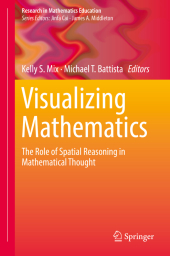 Neuerscheinungen 2018Stand: 2020-02-01 |
Schnellsuche
ISBN/Stichwort/Autor
|
Herderstraße 10
10625 Berlin
Tel.: 030 315 714 16
Fax 030 315 714 14
info@buchspektrum.de |

Michael T. Battista, Kelly S. Mix
(Beteiligte)
Visualizing Mathematics
The Role of Spatial Reasoning in Mathematical Thought
Herausgegeben von Mix, Kelly S.; Battista, Michael T.
1st ed. 2018. 2018. xv, 378 S. 56 SW-Abb., 86 Farbabb. 235 mm
Verlag/Jahr: SPRINGER, BERLIN; SPRINGER INTERNATIONAL PUBLISHING 2018
ISBN: 3-319-98766-6 (3319987666)
Neue ISBN: 978-3-319-98766-8 (9783319987668)
Preis und Lieferzeit: Bitte klicken
This unique volume surveys recent research on spatial visualization in mathematics in the fields of cognitive psychology and mathematics education. The general topic of spatial skill and mathematics has a long research tradition, but has been gaining attention in recent years, although much of this research happens in disconnected subfields. This volume aims to promote interaction between researchers, not only to provide a more comprehensive view of spatial visualization and mathematics, but also to stimulate innovative new directions in research based on a more coordinated effort. It features ten chapters authored by leading researchers in cognitive psychology and mathematics education, as well as includes dynamic commentaries by mathematics education researchers on cognitive psychology chapters, and by cognitive psychologists on mathematics education chapters.
Among the topics included:
From intuitive spatial measurement to understanding of units.
Spatial reasoning: a critical problem-solving tool in children´s mathematics strategy tool-kit.
What processes underlie the relation between spatial skill and mathematics?
Learning with and from drawing in early years geometry.
Communication of visual information and complexity of reasoning by mathematically talented students.
Visualizing Mathematics makes substantial progress in understanding the role of spatial reasoning in mathematical thought and in connecting various subfields of research. It promises to make an impact among psychologists, education scholars, and mathematics educators in the convergence of psychology and education.
Kelly S. Mix, Ph.D., is Professor and Chair of the Department of Human Development and Quantitative Methods at the University of Maryland. A former elementary school teacher with a specialization in mathematics teaching and learning, she received her Ph.D. in Developmental Psychology from the University of Chicago in 1995.


